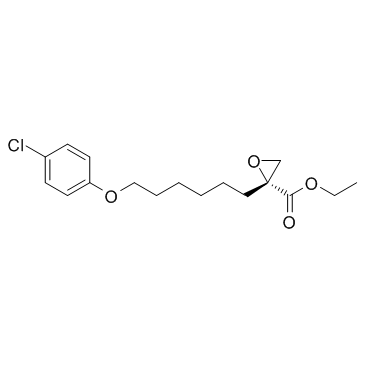
Etomoxir
CAS No. 124083-20-1
Etomoxir( Etomoxir | B 807-54 | B80754 | B-80754 | (R)-(+)-Etomoxir )
Catalog No. M10974 CAS No. 124083-20-1
An irreversible inhibitor of carnitine palmitoyltransferase-1 (CPT-1) that inhibits fatty acid β-oxidation in rat liver with IC50 of 5-20 nM.
Purity : >98% (HPLC)
 COA
COA
 Datasheet
Datasheet
 HNMR
HNMR
 HPLC
HPLC
 MSDS
MSDS
 Handing Instructions
Handing Instructions
| Size | Price / USD | Stock | Quantity |
| 5MG | 60 | In Stock |


|
| 10MG | 105 | In Stock |


|
| 25MG | 205 | In Stock |


|
| 50MG | 375 | In Stock |


|
| 100MG | 557 | In Stock |


|
| 200MG | Get Quote | In Stock |


|
| 500MG | Get Quote | In Stock |


|
| 1G | Get Quote | In Stock |


|
Biological Information
-
Product NameEtomoxir
-
NoteResearch use only, not for human use.
-
Brief DescriptionAn irreversible inhibitor of carnitine palmitoyltransferase-1 (CPT-1) that inhibits fatty acid β-oxidation in rat liver with IC50 of 5-20 nM.
-
DescriptionAn irreversible inhibitor of carnitine palmitoyltransferase-1 (CPT-1) that inhibits fatty acid β-oxidation in rat liver with IC50 of 5-20 nM; affects ketogenesis, cholesterol synthesis, and gluconeogenesis both in vitro and in vivo; decreases viability in LNCaP, VCaP, and patient-derived benign and prostate cancer cells, associated with decreased AR expression, decreased mTOR signaling, and increased caspase-3 activation; decreases xenograft growth in mice.Heart Failure Phase 2 Discontinued(In Vitro):Etomoxir binds irreversibly to the catalytic site of CPT-1 inhibiting its activity, but also upregulates fatty acid oxidation enzymes. Etomoxir is developed as an inhibitor of the mitochondrial carnitine palmitoyltransferase-1 (CPT-1) located on the outer mitochondrial membrane. Etomoxir, in the liver can act as peroxisomal proliferator, increasing DNA synthesis and liver growth. Thus, etomoxir, in addition of being a CPT1 inhibitor could be considered as a PPARalpha agonist. Etomoxir is a member of the oxirane carboxylic acid carnitine palmitoyl transferase I inhibitors and has been suggested as a therapeutic agent for the treatment of heart failure. Acute Etomoxir treatment irreversibly inhibits the activity of carnitine palmitoyltransferase I. As a result, fatty acid import into the mitochondria and β-oxidation is reduced, whereas cytosolic fatty acid accumulates and glucose oxidation is elevated. Prolonged incubation (24 h) with Etomoxir produces diverse effects on the expression of several metabolic enzyme. (In Vivo):Etomoxir is an inhibitor of free fatty acid (FFA) oxidation-related key enzyme CPT1. P53 interacts directly with Bax, which is inhibited by Etomoxir, further confirming the direct interaction of P53 and Bax, and the involvement of FAO-mediated mitochondrial ROS generation in db/db mice. Rats are injected daily with Etomoxir, a specific CPT-I inhibitor, for 8 days at 20 mg/kg of body mass. Etomoxir-treated rats display a 44% reduced cardiac CPT-I activity. The treatment of Lewis rats for 8 days with 20 mg/kg Etomoxir does not alter blood glucose, which is in line with comparable etomoxir-feeding studies. Similarly, Etomoxir feeding does not affect general growth characteristics such as gain in body mass, nor does it affect hindlimb muscle mass. However, heart mass and liver mass are both significantly increased by 11% in Etomoxir-treated rats.
-
In Vitro——
-
In Vivo——
-
SynonymsEtomoxir | B 807-54 | B80754 | B-80754 | (R)-(+)-Etomoxir
-
PathwayOthers
-
TargetOther Targets
-
RecptorOther Targets
-
Research AreaMetabolic Disease
-
Indication——
Chemical Information
-
CAS Number124083-20-1
-
Formula Weight326.8151
-
Molecular FormulaC17H23ClO4
-
Purity>98% (HPLC)
-
Solubility10 mM in DMSO
-
SMILESO=C([C@]1(CCCCCCOC2=CC=C(Cl)C=C2)OC1)OCC
-
Chemical Name2-Oxiranecarboxylic acid, 2-[6-(4-chlorophenoxy)hexyl]-, ethyl ester, (2R)-
Shipping & Storage Information
-
Storage(-20℃)
-
ShippingWith Ice Pack
-
Stability≥ 2 years
Reference
1. Lopaschuk GD, et al. Circ Res. 1988 Dec;63(6):1036-43.
2. Kruszynska YT, et al. Biochem Pharmacol. 1987 Nov 15;36(22):3917-21.
3. Schlaepfer IR, et al. Mol Cancer Ther. 2014 Oct;13(10):2361-71.
molnova catalog



related products
-
Marstacimab
Marstacimab (PF-06741086), an anti-tissue factor pathway inhibitor (TFPI) monoclonal antibody, is utilized in hemophilia research .
-
Quercetagetin 3-meth...
The herbs of Tagetes erecta.
-
OTS514
OTS514 is a potent TOPK inhibitor. OTS514 exhibits a growth-suppressive effect on small cell lung cancer. OTS514 effectively suppressed the growth of SCLC cell lines (IC50: 0.4 ~ 42.6 nM).



 Cart
Cart
 sales@molnova.com
sales@molnova.com


